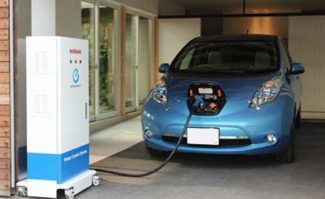Fans of electric automobiles love the fact that they’re quiet, zippy and take far less maintenance than gasoline-powered cars (no oil changes, no ignition system, no radiator fluid…). In principle, electrics are also more climate-friendly – although until coal-fired power plants start capturing and storing CO2 to keep it out of the air, the climate advantage is still just a principle in lots of places.
But now, GE has come up with another plus – albeit a small one – for electric vehicles: they can power up your house during a blackout, like the one that disrupted the Northeast during last fall’s unprecedented Snowtober storm, or during the winds and rain from Hurricane Irene a few weeks earlier.
GE introduced the concept behind this new idea a few days ago at the Society of Automotive Engineers World Congress in Detroit. It didn’t introduce any new technology, though, because the technology (or some of it, anyway), already exists. All you do, explains GE CEO Jeff Immelt in a video shot at the conference, is connect your Wattstation EV Charger (you have one of those, right?) to your Nucleus Home Energy Management System (check) to the Smart Grid (we’re still working on that), and voila! Thanks to your electric vehicle’s battery, which is strong enough to push a ton of metal down the road at high speed, your lights will stay on even as climate change makes some types of extreme weather events more common and more severe – along, presumably, with blackouts.
“No more debating,” wrote a publicist touting the technology, “whether getting your child a glass of milk will ruin your refrigerator’s store of coolant and your foodstuffs.” (Note to publicists: The sad and thirsty child angle gets me every time.)
Seriously, though, while this milk-saving technology isn’t quite ready for widespread distribution, it’s something I would look into once it reaches that point. My own house in New Jersey was dark for three days after Tropical Storm Irene, and two days after Snowtowber. I flirted briefly, twice, with the idea of getting a backup generator – noisy, possibly dangerous, but maybe worth it to keep a few lights on and the food from spoiling.
But the idea of a backup power supply that could also take me on errands around town, without requiring an oil change every 3,000 miles is a whole lot more appealing.
This article was originally published on Climate Central – www.climatecentral.org. Reproduced with permission.










